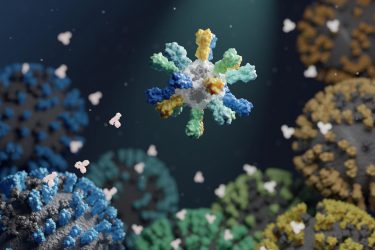Nanoparticle vaccine shown to block range of flu strains in pre-clinical study
Posted: 25 March 2021 | Victoria Rees (Drug Target Review) | No comments yet
A new vaccine formulated with nanoparticles protected animal models from a variety of seasonal and pandemic influenza strains.


Researchers have developed experimental flu shots that protected animals in pre-clinical studies from a wide variety of seasonal and pandemic influenza strains. The scientists say that, if proven safe and effective, these next-generation influenza vaccines may replace current seasonal options by providing protection against many more strains that current vaccines do not adequately cover. The new vaccines are currently being advanced towards clinical testing.
The study was conducted at the University of Washington (UW) School of Medicine, US, and the Vaccine Research Center, a part of the US National Institute of Allergy and Infectious Diseases (NIAID).
According to the researchers, available flu vaccines, which need to be taken seasonally, often fail to protect against many circulating flu strains that cause illness and the threat of another influenza pandemic looms.
Biomarkers aren’t just supporting drug discovery – they’re driving it
FREE market report
From smarter trials to faster insights, this report unpacks the science, strategy and real-world impact behind the next generation of precision therapies.
What you’ll unlock:
- How biomarkers are guiding dose selection and early efficacy decisions in complex trials
- Why multi-omics, liquid biopsy and digital tools are redefining the discovery process
- What makes lab data regulatory-ready and why alignment matters from day one
Explore how biomarkers are shaping early drug development
Access the full report – it’s free!
“Most flu shots available today are quadrivalent, meaning they are made from four different flu strains. Each year, the World Health Organization (WHO) makes a bet on which four strains will be most prevalent, but those predictions can be more or less accurate. This is why we often end up with ‘mismatched’ flu shots that are still helpful but only partially effective,” said lead author Daniel Ellis, from UW School of Medicine.


A depiction of a nanoparticle vaccine that contains proteins from many different flu strains [credit: UW Medicine Institute for Protein Design].
To create improved influenza vaccines, the team attached haemagglutinin proteins from four different influenza viruses to custom-made protein nanoparticles. This approach enabled an unprecedented level of control over the molecular configuration of the resulting vaccine and yielded an improved immune response compared to conventional flu shots.
The researchers found that the new nanoparticle vaccines, which contain the same four haemagglutinin proteins of commercially available quadrivalent influenza vaccines, elicited neutralising antibody responses to vaccine-matched strains that were equivalent or superior to the commercial vaccines in mice, ferrets and non-human primates. The nanoparticle vaccines – but not the commercial vaccines – also induced protective antibody responses to viruses not contained in the vaccine formulation. These include avian influenza viruses H5N1 and H7N9, which are considered pandemic threats.
“The responses that our vaccine gives against strain-matched viruses are really strong and the additional coverage we saw against mismatched strains could lower the risk of a bad flu season,” said Ellis.
The results of the study were published in Nature.
Related topics
Immunology, In Vivo, Nanomedicine, Nanoparticles, Vaccine
Related conditions
Influenza
Related organisations
University of Washington School of Medicine, US National Institute of Allergy and Infectious Diseases (NIAID)
Related people
Daniel Ellis







